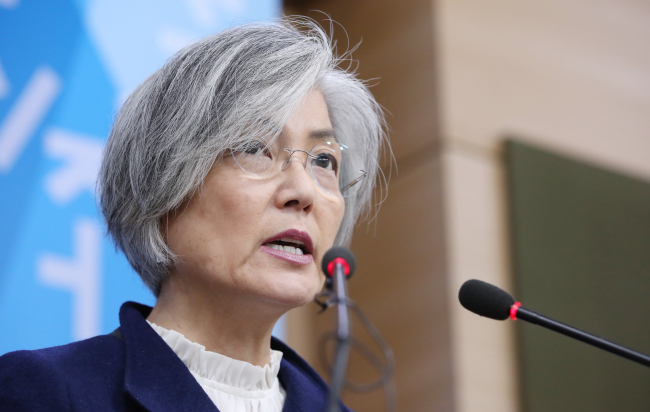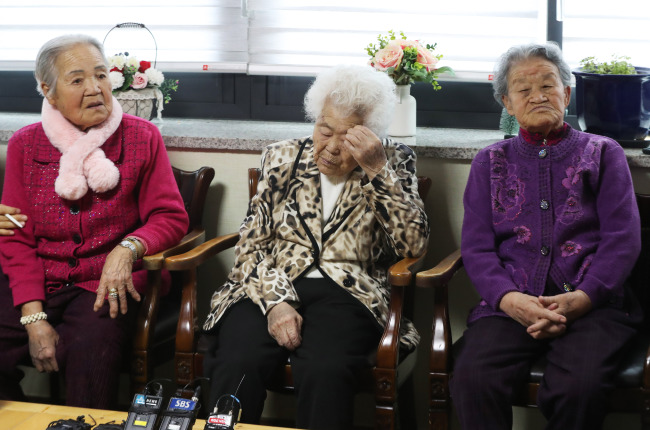The South Korean government said Tuesday that it will not seek to renegotiate the 2015 Korea-Japan deal on Korean victims of Japan’s wartime sexual enslavement, but reiterated that the controversial agreement cannot resolve the “comfort women” issue.
Sticking to the deal under which Japan apologized to the victims and provided 1 billion yen ($8.8 million) to a fund to support them, the Foreign Ministry said that it will replace Japan’s money for the victims from the government’s budget.
“We cannot deny that the 2015 deal was an official bilateral agreement. Given that, the government will not demand a renegotiation of the deal,” Foreign Minister Kang Kyung-wha said in a press briefing.
“But we hope that Japan will continue to make efforts to restore the victims’ honor and dignity, and heal the wounds of the victims in their hearts in accordance with universal human rights standards," she said.
“The 2015 deal which does not reflect victims’ opinions cannot be a fundamental solution to the issue of comfort women."

Foreign Minister Kang Kyung-wha (Yonhap)
In response, Japanese Foreign Minister Taro Kono said Tuesday that Tokyo could not accept South Korea‘s calls for additional measures. Japan has urged South Korea to abide by the accord, saying the issue was settled under the 2015 deal, and any attempts to amend it could harm bilateral ties.
In the deal made on Dec. 28, 2015, Japan offered the funds, worth about 10.8 billion won, to a foundation alongside an apology to the victims in return for Seoul’s promise not to raise the issue again in international forums. The two countries described the deal as “final and irreversible.”
The government‘s decision comes despite a Korean task force’s conclusion that the deal, signed by former President Park Geun-hye and Japanese Prime Minister Shinzo Abe, had procedural problems. According to the task force, the previous government failed to sufficiently consult with the victims in the process and did not disclose some of the sensitive details of the deal due to a possible public backlash.
President Moon Jae-in called the deal “gravely flawed,” ordering follow-up measures to address victims’ grievances. Since then, Kang has met with 23 surviving victims to seek their opinions, as part of the government’s drive to pursue a “victim-focused approach,” according to the ministry.

Victims of Japan's sexual slavery during the WWII listen to Foreign Minister Kang Kyung-wha's speech on TV. (Yonhap)
While there are differing opinions on what to do with the funds offered by Japan, the government has said it will not use the remaining funds -- about 6 billion won -- and will consult with Japan to decide what should be done. In the meantime, the ministry will set aside the same approximately 10.8 billion won in the government budget to implement follow-up measures.
Lee Ok-seon, 90, one of the surviving victims living at the House of Sharing, a nursing home for victims, reportedly expressed regret over the decision. “The (2015) deal was made without victims knowing about it. It was completely wrong. It should be done again. It should be invalidated. What we want is an apology from Japan,” she was quoted as saying.
Some victims and their rights groups have called for the invalidation of the deal and the return of money already given by Japan, saying it failed to reflect the victims’ demands of a sincere apology and legal compensation from the Japanese government.
As for the Reconciliation and Healing Foundation, which was established under the Gender Equality Ministry to help the victims following the agreement, the government did not elaborate on its fate.
“What the government should do is not just gather opinions, but immediately disband the foundation,” the victims’ rights groups said in a statement. They view the foundation as symbolizing the 2015 deal.
The decision appears to reflect Moon‘s two-track approach toward Japan, separating historical disputes from other issues. The Foreign Ministry reiterated it would continue to seek to “harmoniously” and “peacefully” tackle the historical issues while pursuing a future-oriented relationship with Japan.
Earlier on the campaign trail, Moon promised to renegotiate the comfort women deal.
Japan’s sexual enslavement of Korean women remains a key source of dispute between South Korea and Japan. According to historians, up to 200,000 women, mostly from Korea, are estimated to have been forced into sexual servitude at Japanese military brothels during World War II. Japan colonized Korea from 1910-45.
By Ock Hyun-ju (laeticia.ock@heraldcorp.com)







